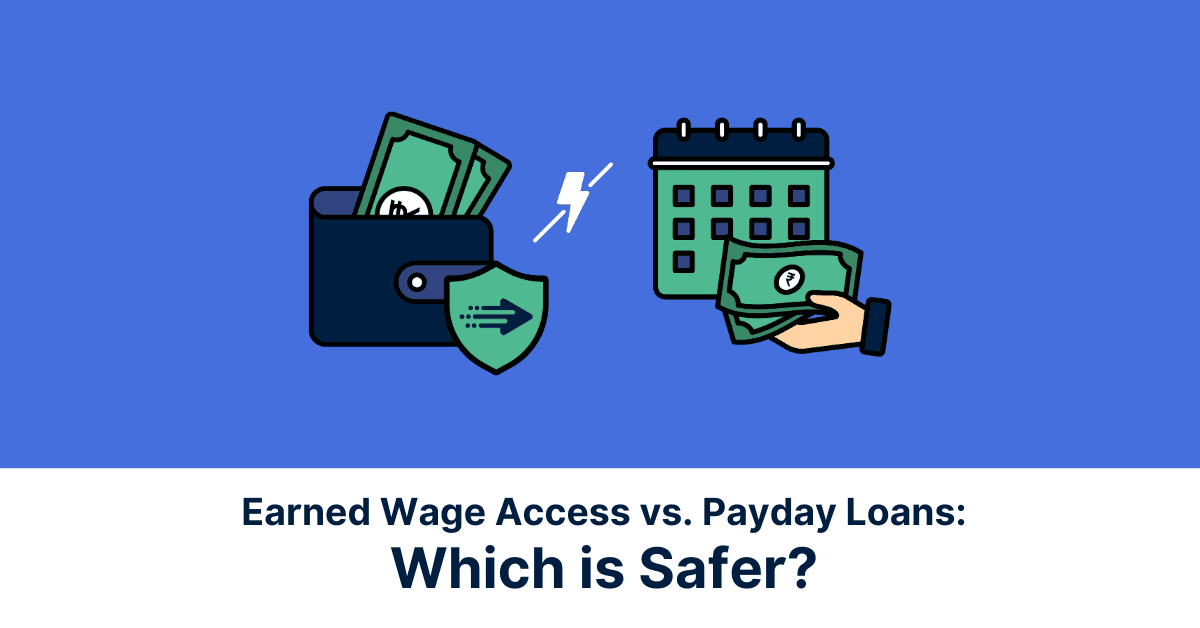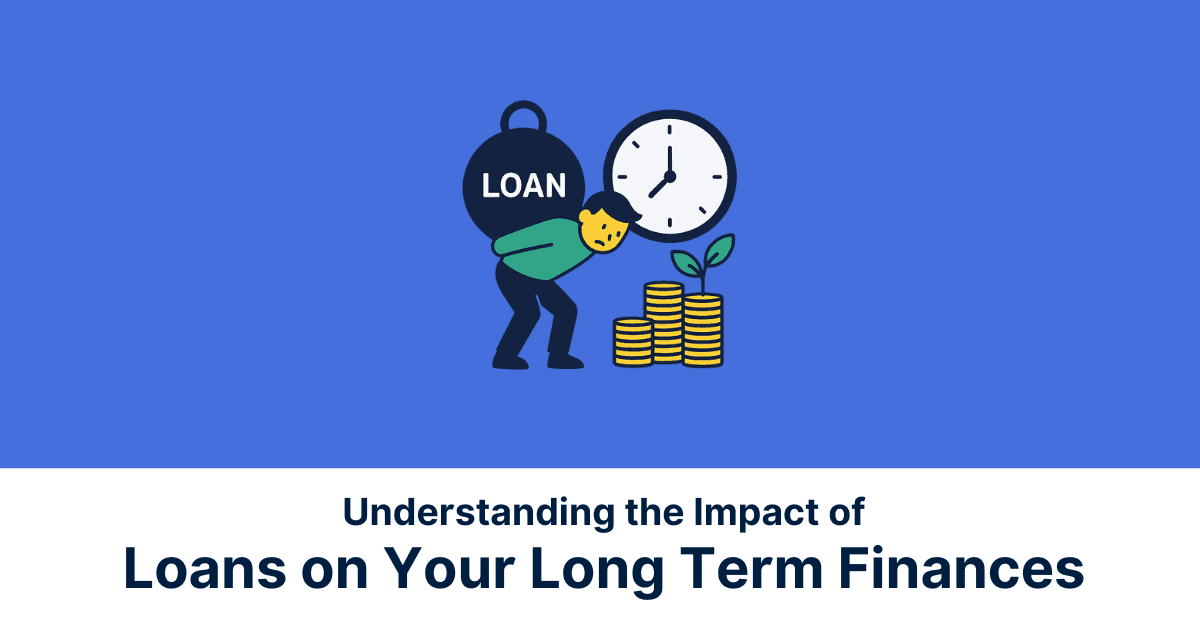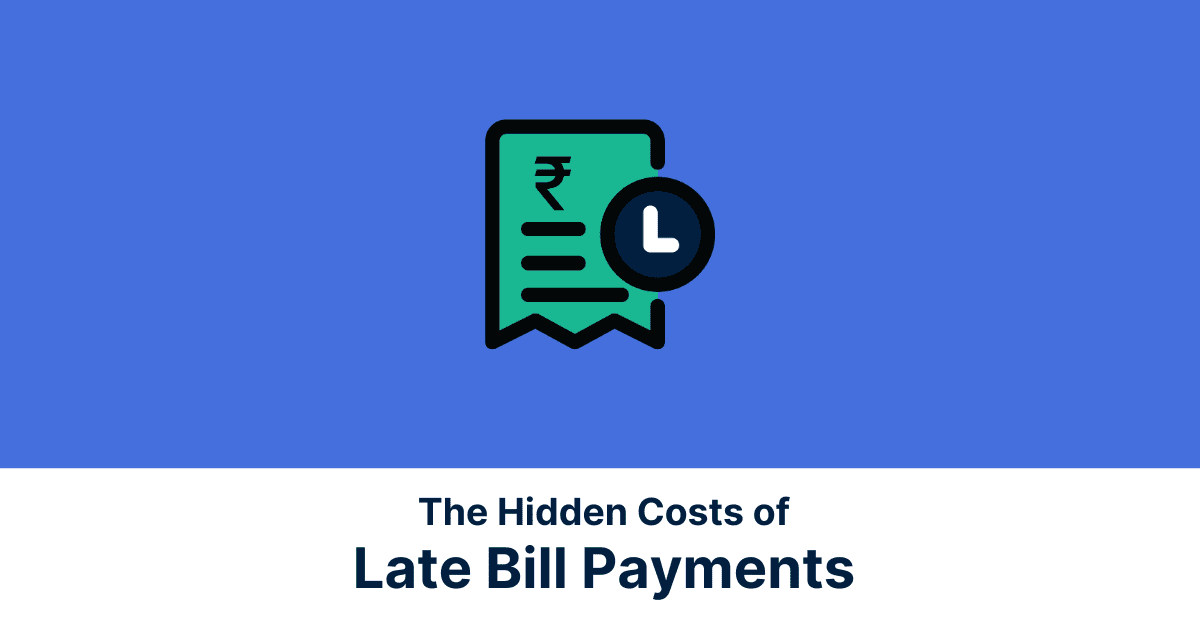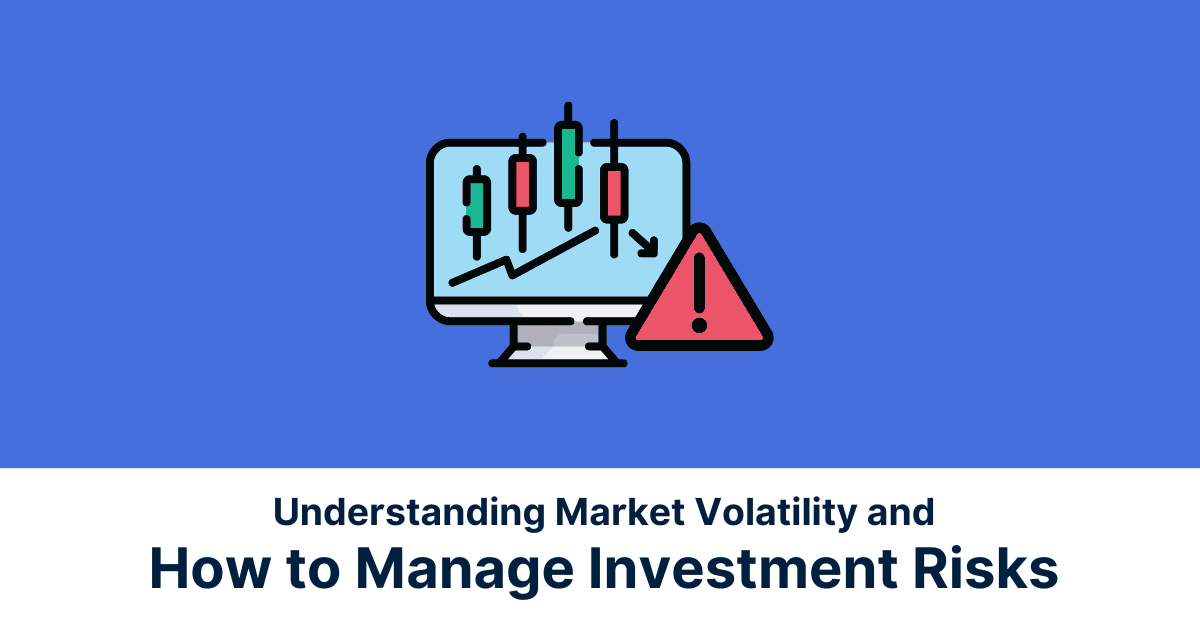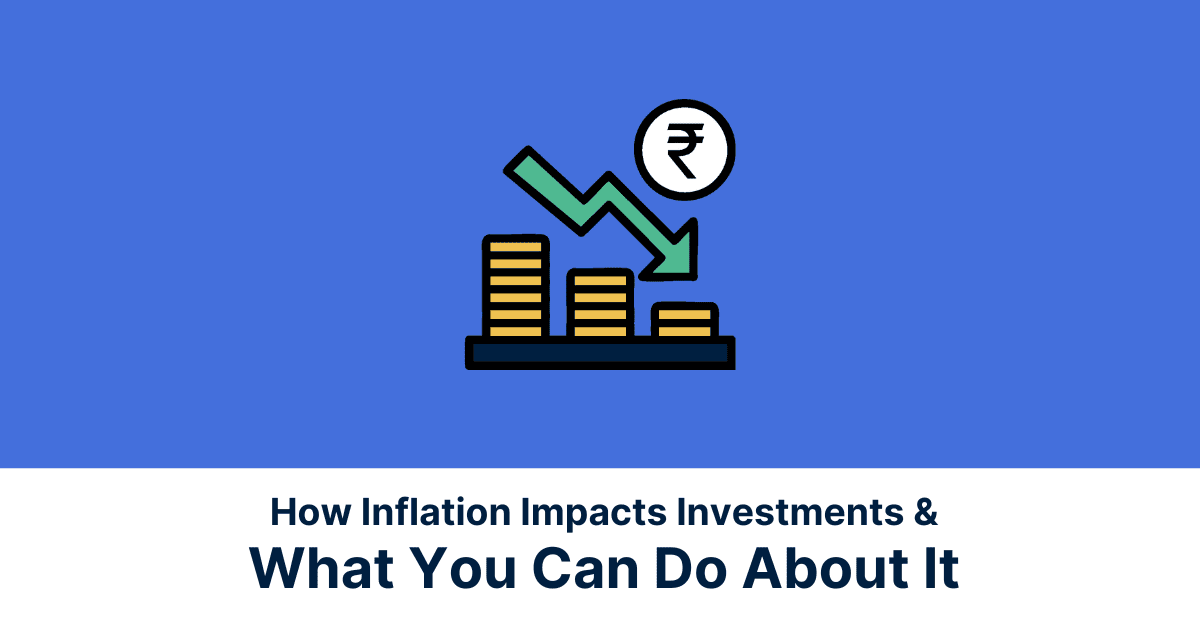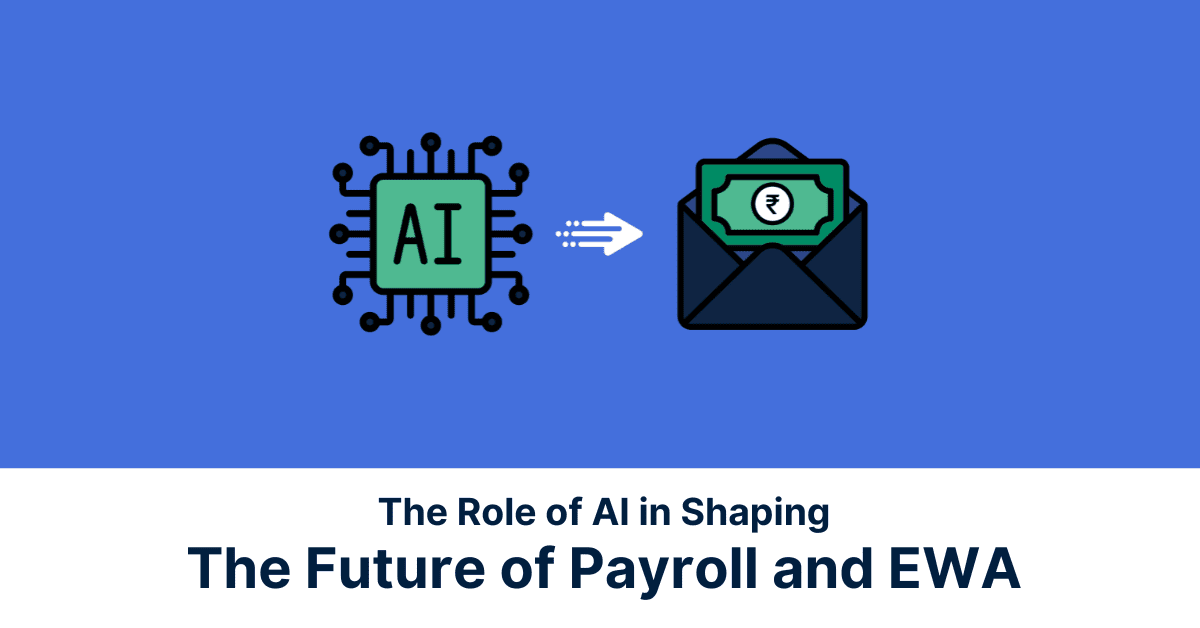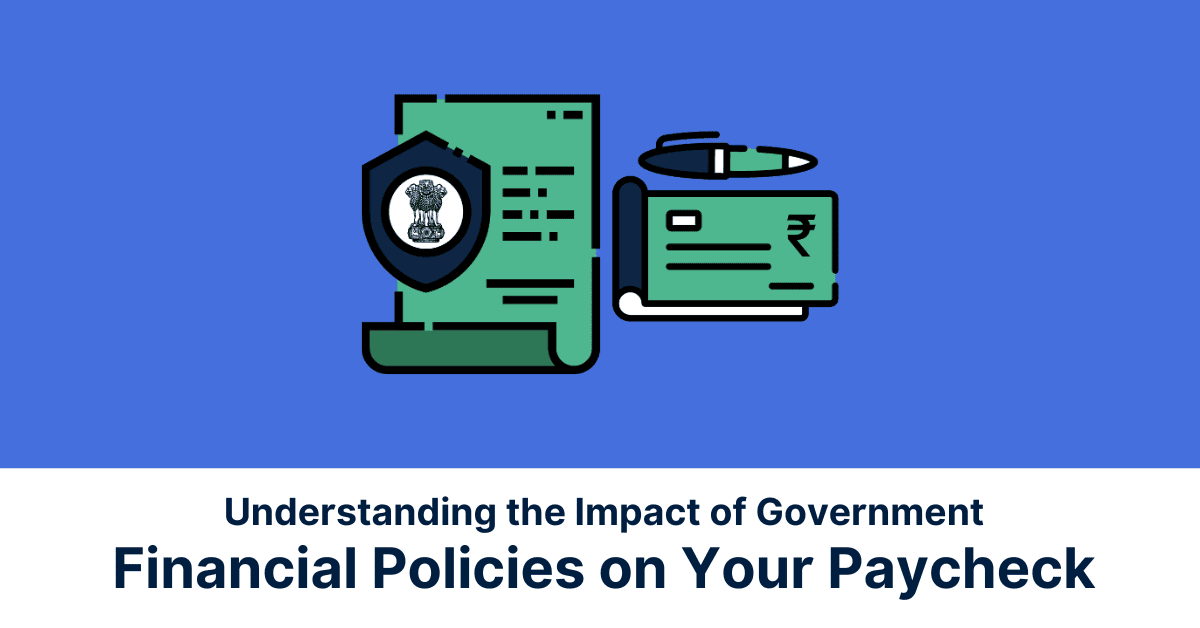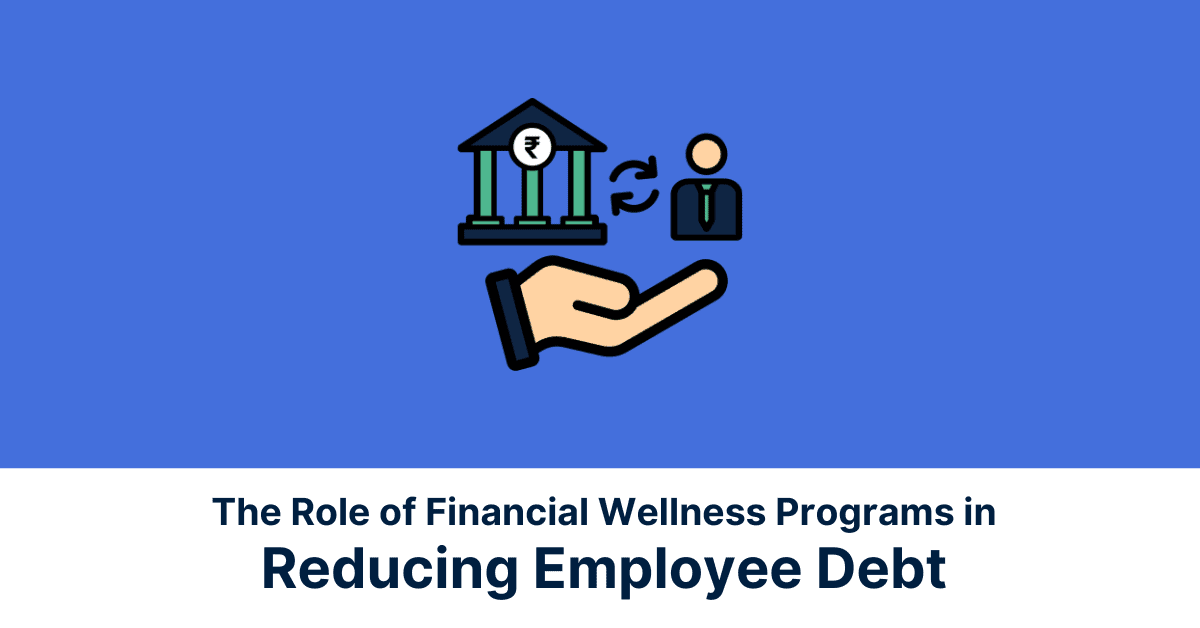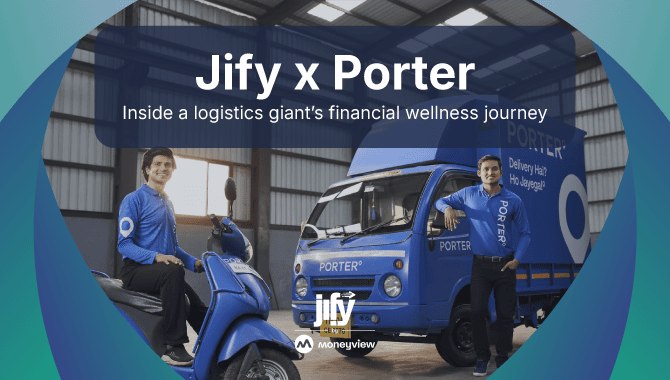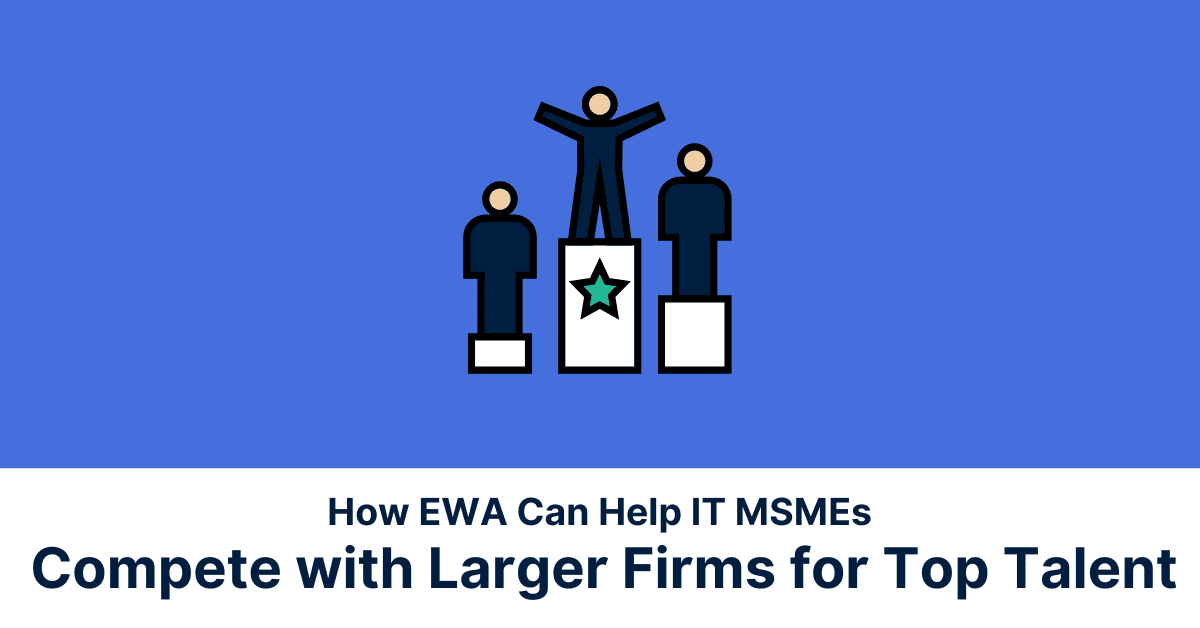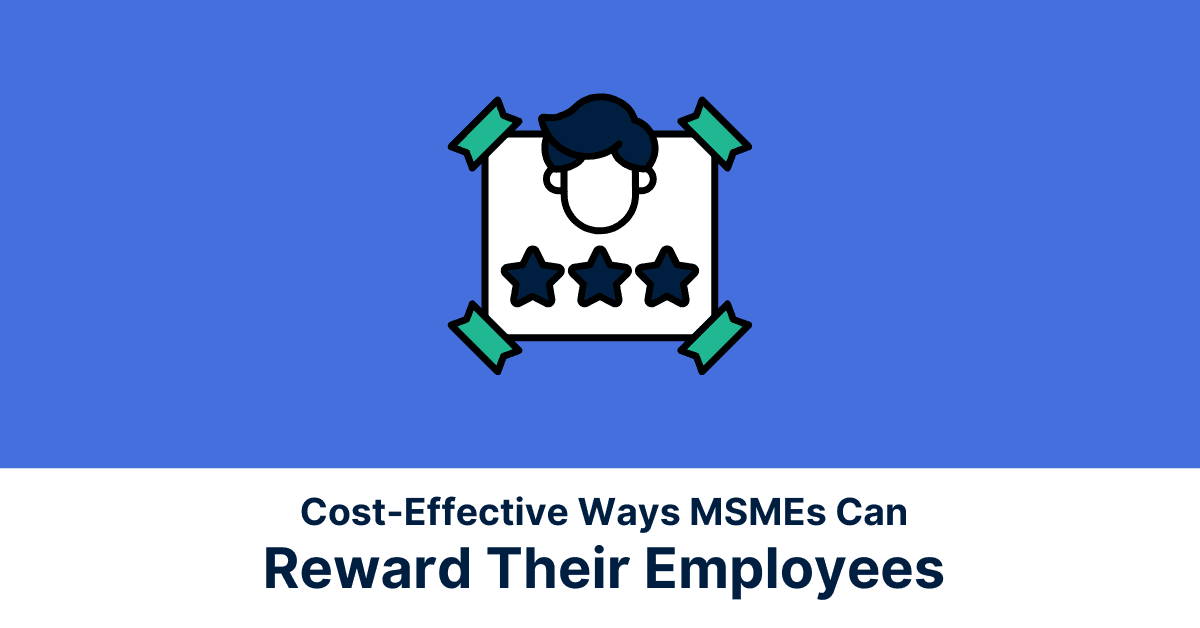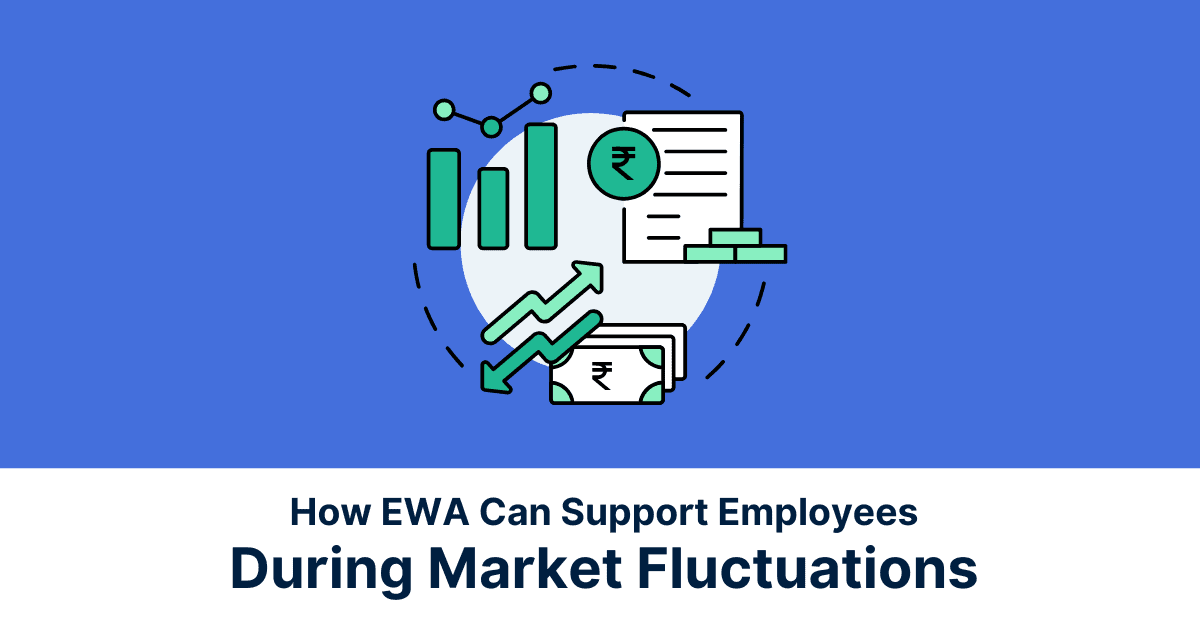Unexpected expenses happen, and when they do, we often need quick cash. Two options, Earned Wage Access (EWA) and payday loans, offer fast access to funds, but differ significantly in cost and long-term impact. EWA lets you access already-earned wages, bridging the gap between paychecks without high-interest debt. Payday loans are short-term, high-cost loans with hefty fees, potentially trapping borrowers in debt. This comparison explores these differences, also touching on cash advances. It’s important to consider these options carefully, especially in a context where national debt in India reached about 81.68% of the gross domestic product in 2022.
What is Earned Wage Access (EWA)?
Earned Wage Access (EWA) allows employees to access a portion of their earned but unpaid wages before their regular payday. Offered through employers or third-party platforms, EWA integrates with payroll systems, enabling employees to request early access to their earnings via apps or online portals. Funds are typically available instantly or within a few hours. Unlike payday loans, EWA doesn’t charge high interest rates, though some providers may have small transaction fees. EWA aims to improve financial flexibility and reduce reliance on high-cost borrowing.
What is a Payday Loan?
A payday loan is a short-term, high-interest loan, typically for a small amount, that is intended to be repaid on the borrower’s next payday. These loans are often marketed as a quick solution for unexpected expenses, but they come with exorbitant fees and interest rates, often expressed as an Annual Percentage Rate (APR) that can reach triple digits. Payday loans can create a cycle of debt, as borrowers often find themselves needing to renew or extend the loan when they can’t repay it on time, incurring even more fees.
Earned Wage Access vs. Payday Loans: Key Differences
Costs and Fees
One of the most prominent differences between Earned Wage Access and payday loans is the cost associated with each option. Payday loans typically come with exorbitant interest rates and fees. Borrowers who fail to repay payday loans on time may face additional fees and penalties, trapping them in a cycle of debt.
In contrast, EWA is a far more affordable solution. Many EWA providers charge little to no fees for accessing earned wages. Some platforms may apply a small transaction fee (typically a few dollars per withdrawal), but there is no accumulating interest, making it a more sustainable financial tool for employees.
The affordability of EWA makes it a better alternative for workers who need short-term financial assistance without incurring the heavy financial burden that payday loans impose.
Repayment Process
The repayment process for Earned Wage Access (EWA) is seamless and structured to prevent financial strain. Repayments are typically made automatically through payroll deductions, meaning that the amount accessed is subtracted from the employee’s next paycheck. This eliminates the need for manual repayments and helps employees avoid additional debt.
Payday loans, on the other hand, require direct repayment from the borrower, usually within a short timeframe (such as two weeks). These loans often come with high-interest rates and strict repayment deadlines. If borrowers fail to repay on time, they may incur hefty rollover fees, leading to a cycle of debt. Additionally, payday lenders may withdraw funds directly from the borrower’s bank account, potentially leading to overdraft fees if the account lacks sufficient balance.
Impact on Employee Financial Health
Earned Wage Access (EWA) is designed to enhance employee financial well-being by providing early access to earned income without the risks associated with traditional borrowing. By allowing employees to withdraw wages before payday, EWA helps prevent late bill payments, overdraft fees, and financial stress. Since repayment is automatically deducted from future wages, employees do not accumulate debt or face long-term financial strain.
In contrast, payday loans often contribute to a cycle of debt. The high fees and interest rates make repayment difficult, leading many borrowers to take out additional loans to cover previous debts. This creates a pattern of repeat borrowing, trapping individuals in a continuous financial struggle.
Benefits of Choosing Earned Wage Access Over Payday Loans
Lower Financial Burden
EWA significantly reduces financial stress by offering low-cost access to earned wages without the burden of high-interest rates. Since repayment is automated through payroll deductions, employees can access funds responsibly without worrying about accumulating debt. The transparent fee structures of EWA services ensure that users do not face unexpected costs, unlike payday loans that can lead to ongoing financial difficulties.
In contrast, payday loans can quickly spiral into an unmanageable debt cycle. The high interest rates and additional fees make repayment challenging, often forcing borrowers to take out new loans to cover previous ones. This cycle of repeat borrowing increases financial strain and negatively impacts long-term financial stability.
Instant Access to Earned Income
Earned Wage Access (EWA) provides employees with immediate access to the wages they’ve already earned, without having to wait until their next payday. Through EWA platforms, employees can withdraw a portion of their earned income at any time during the pay period, usually through a mobile app. This eliminates the need for employees to rely on high-interest loans or credit to cover unexpected expenses, as they can access their earnings as needed.
The key benefit of EWA is that it reduces financial stress by offering more flexibility with cash flow. It also helps prevent employees from resorting to payday loans or credit cards, which often come with high-interest rates and fees. Instead, employees can access their funds when necessary, paying only a small fee for the service, which is typically much lower than the cost of traditional loans or credit. This can improve workers’ financial well-being and stability, reduce their dependence on debt, and help them avoid financial pitfalls.
Enhancing Employee Financial Wellness
Here’s how EWA enhances financial wellness programs:
- Improved Financial Security: EWA reduces the need for employees to rely on high-interest payday loans or credit cards, both of which can cause long-term financial strain. By allowing workers to access earned wages as they need them, EWA helps reduce financial burden, providing flexibility and peace of mind.
- Empowerment and Control: Employees gain more control over their finances by choosing when and how much to withdraw from their earned wages, rather than being dependent on a set payday schedule. This flexibility can help individuals manage their finances better, avoiding the need to wait until the next paycheck to cover urgent expenses.
- Increased Financial Literacy: Many EWA platforms integrate tools to help employees track their spending and manage their budgets. This can contribute to better financial literacy, guiding employees towards more responsible money management and creating awareness about their financial habits.
- Prevention of Debt: EWA reduces the risk of employees falling into cycles of debt. Instead of taking on high-interest loans, workers can access earned wages at a lower cost, promoting responsible borrowing and reducing reliance on payday lenders.
- Promotion of Savings: Some EWA services offer savings features, encouraging employees to set aside a portion of their earnings for future needs or emergencies. This can further contribute to financial stability and better long-term financial health.
Risks of Payday Loans and Their Impact on Employees
High Interest Rates and Fees
High-interest loans that are typically due on the borrower’s next payday. While they offer quick access to cash, they come with extremely high Annual Percentage Rates (APRs) and additional fees that can create a significant financial burden for employees, particularly those who rely on these loans to cover unexpected expenses.
Here’s how payday loans become a financial challenge:
- Extremely High APRs: Payday loans often have APRs that range from 300% to 1,000%, depending on the lender and local regulations. This means that the cost of borrowing is incredibly high compared to traditional loans or credit cards. For example, borrowing ₹10000 could result in paying back ₹11000 or more due to the inflated interest rate.
- Additional Fees: In addition to high interest, payday lenders typically charge additional fees, such as transaction fees or loan origination fees. These can add up quickly, making it even more expensive for employees to repay the loan. If the loan is not paid on time, the lender may also charge late fees or rollover fees, further compounding the financial burden.
- Cycle of Debt: Because payday loans are typically due in full on the borrower’s next payday, employees who cannot repay the loan in time often end up borrowing again to cover the original debt. This creates a cycle of debt, where each new loan is stacked on top of the old one, leading to even higher interest and fees.
- Stress and Financial Strain: The high cost of payday loans can lead to significant financial stress. For employees living paycheck to paycheck, the additional burden of repaying a payday loan can create an ongoing cycle of financial instability. This can impact their ability to meet other financial obligations, such as rent, utilities, and daily living expenses.
- Limited Long-Term Benefit: Payday loans provide temporary relief, but their high cost and short repayment period rarely solve underlying financial issues. Employees are left with less disposable income in the long run, which can impact their ability to save, invest, or plan for future financial goals.
Debt Cycles and Repeat Borrowing
Credit Information Company (CIC) reported that around 40 crore people in India were in debt. Payday loans create a dangerous cycle of debt where employees repeatedly borrow to pay off previous loans.
Here’s how it unfolds:
- Short-Term Loans, Long-Term Consequences: Payday loans are meant for quick fixes but have high interest and fees, making repayment difficult. When employees can’t pay back, they may borrow again to cover the original debt.
- Rollovers and Renewals: If not paid on time, payday loans are rolled over or renewed, adding more fees and interest, increasing the total debt.
- Escalating Debt: With each rollover, the debt grows, as new loans accumulate more interest and charges, making it harder to repay.
- Reduced Ability to Pay Off Debt: As debt increases, employees may need to borrow again to survive, trapping them in a continuous debt cycle.
- Financial Stress and Impact on Well-Being: Repeated borrowing strains finances, leading to anxiety, stress, and emotional distress.
- Difficulty Breaking the Cycle: Escaping the cycle is tough without affordable alternatives, and the growing debt may force extreme measures like bankruptcy.
The Role of Employers in Promoting Safe Financial Options
Reducing Financial Stress in the Workplace
Providing Earned Wage Access (EWA) can significantly reduce financial stress in the workplace by offering employees immediate access to wages they’ve already earned. This flexibility helps employees manage unexpected expenses without resorting to high-interest payday loans or credit cards, which can cause long-term financial strain. With reduced financial anxiety, employees can focus better on their tasks, improving productivity and engagement at work.
Offering EWA enhances job satisfaction, as employees feel valued and supported by their employer in times of financial need. This can lead to higher retention rates, as employees are more likely to stay with employers who care about their financial well-being. When employees are thriving, they’re 32% less likely to be watching for or actively seeking another job.
Building a Positive Company Culture with EWA
Offering Earned Wage Access (EWA) as a benefit helps build a supportive workplace culture by demonstrating that the company values its employees’ financial well-being. EWA provides employees with access to the wages they’ve already earned, giving them flexibility to manage unexpected expenses without turning to high-interest loans or credit cards. This builds trust between employees and employers, as workers feel their needs are prioritized, leading to a stronger sense of loyalty and engagement.
When employees feel financially secure, they are more likely to be focused, motivated, and satisfied with their jobs, contributing to a positive, productive work environment. EWA also shows that the company is proactive in addressing the stressors employees may face outside of work, which can increase the overall company culture by promoting well-being, transparency, and care for employees as whole individuals, not just workers. This leads to higher morale and a sense of community within the company.
Future Outlook: The Growth of Earned Wage Access in India
Earned Wage Access (EWA) is gaining traction in India, especially among startups and SMEs, revolutionizing employee financial management. This on-demand salary model lets employees access part of their earned but unpaid wages before payday, addressing cash flow needs without high-interest loans. For startups and SMEs, EWA enhances talent attraction and retention by showing a commitment to employee financial well-being. A survey found 59% of respondents considered EWA a key factor in job decisions.
Fintech platforms make EWA implementation seamless and affordable, integrating with payroll systems to automate the process and reduce administrative overhead. This accessibility allows businesses of all sizes to offer EWA.
As part of financial wellness programs, EWA helps employees cover unexpected expenses without debt, reducing financial stress, improving productivity, and fostering a better work-life balance.
Conclusion: Why Earned Wage Access is a Safer Choice
A smarter alternative to payday loans is EWA. Access your earned wages early, avoid the debt trap, and handle unexpected expenses with ease. EWA reduces financial stress, boosting employee morale and productivity. When employees feel secure financially, they’re happier and more engaged. Offering EWA demonstrates a commitment to employee well-being, creating a positive work environment and strengthening loyalty. Prioritising employee financial wellness is no longer optional; it’s a smart business strategy.
Jify, a leading EWA provider in India, makes this a reality. Our user-friendly platform puts financial control back in the hands of employees, boosting their morale and loyalty. It’s a win-win for everyone: happier employees, a more productive workforce, and a stronger, more engaged company culture.
FAQs
1. How do payday loans impact employee financial wellness?
Earned Wage Access (EWA): Lets employees access already-earned wages before payday, improving cash flow without added debt.
Payday Loans: Short-term, high-interest loans that can trap borrowers in a cycle of debt due to expensive fees and short repayment periods.
Financial Wellness: A state of being where individuals have control over their finances, manage expenses, and feel financially secure.
Debt Cycle: A situation where individuals repeatedly borrow money to repay existing debts, leading to increasing financial hardship.
Fintech: Technology used to improve and automate financial services and processes.
2. Are there any fees associated with Earned Wage Access?
Yes, some Earned Wage Access (EWA) providers do charge fees, but it’s not always the case, and the fees are typically much lower than those associated with payday loans. Here’s a breakdown:
- Free Options: Many employer-sponsored EWA programs offer free access to earned wages, especially for standard transfers that might take a few business days.
- Fees for Faster Access: Some providers charge a small fee for instant or expedited transfers. This fee can vary depending on the provider and the amount you’re accessing.
- Subscription Fees: Some EWA platforms might charge a small monthly subscription fee for access to their services.
3. How does repayment work for Earned Wage Access?
Repayment for Earned Wage Access (EWA) is typically straightforward and tied to the employee’s regular payday. Here’s how it works:
Access: Employees access a portion of earned wages before payday, usually via a digital platform.
Deduction: The accessed amount is automatically deducted from their next paycheck.
Cost: EWA typically doesn’t charge interest or high fees. Repayment is the amount accessed.
Flexibility: Some programs offer repayment over multiple pay cycles, but the process remains predictable.
*Disclaimer:
The information contained herein is not intended to be a source of advice concerning the material presented, and the information contained in this article does not constitute investment advice. The ideas presented in the article should not be used without first assessing your financial situation or without consulting a financial professional.
